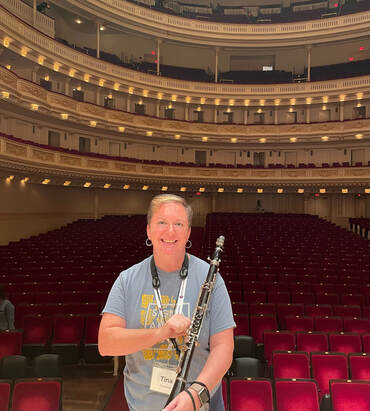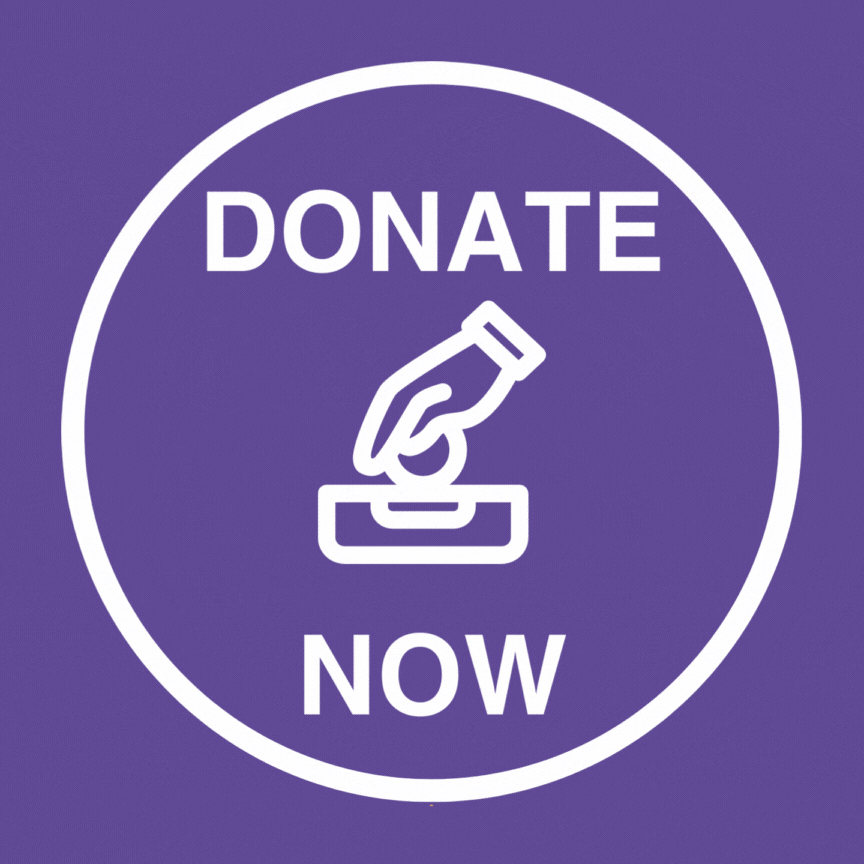Case study: From hospital to world-renowned stageThe story of Tina Holmes-Davis and the one-handed clarinet
|
During the course of our work, OHMI very often comes across individuals whose ability to make music is seriously impeded by a seismic event.
That was certainly the case for Tina Holmes-Davis, an accomplished clarinettist and bass player living in Georgia, USA. It seemed that a brain injury would cut short her musical talent. However, Tina – with her fierce determination and equipped with the right adapted instrument – defied the odds and recently perform at Carnegie Hall, New York.
That was certainly the case for Tina Holmes-Davis, an accomplished clarinettist and bass player living in Georgia, USA. It seemed that a brain injury would cut short her musical talent. However, Tina – with her fierce determination and equipped with the right adapted instrument – defied the odds and recently perform at Carnegie Hall, New York.
Here, Tina recounts her progress from hospital to world-renowned stage.
“It is unlikely you will be able to walk or talk again. There were the words delivered by my medical team when I regained consciousness after a blood clot to my brain. It was December 2018, and I spent a week in ICU, the rest of the month in rehab and then three months under medical supervision. It was four months before I could even move, and I was sent home in a wheelchair.
Before my injury, I had been an accomplished clarinettist, having taken up the instrument before the age of eight. I was also a bass clarinet player specialist, had performed with a professional clarinet choir, and was a band director at junior high school. In those early days after my injury, being able to return to playing an instrument in the conventional way seemed inconceivable. Slowly but surely, my husband started to sell off my instruments, and we turned our attentions instead to an alternative route back to music.
I was introduced to the Toggle-Key Saxophone, an instrument suitable for one-handed playing, created by Professor David Nabb of the University of Nebraska and Stelling Brass & Wind of Kearney. That instrument was not suitable for me, alas, as it lacked a thumb rest. More than that, it was not the instrument I had first fallen in love with as a child.
If the clarinet were to be my instrument of choice once again, then I would need the help of Peter Worrell, a well-renowned woodwind instrument maker who had also produced a one-handed clarinet. David facilitated an introduction to Peter and the instrument that has saved my life in many ways. I am now performing in two bands, a clarinet choir, and have performed duets with our clarinet professor.
My playing is not always perfect, but I can do it. My disability becomes invisible when I have the clarinet with me, and I’m simply a player in the clarinet choir like any other.
Peter’s instrument was with me when I joined my clarinet choir in their performance at Carnegie Hall, in June 2022. There were still obstacles I needed to face; for example, I wasn’t allowed to travel on my own, and transporting my instrument and equipment takes considerable effort and planning. Having to stand up so many times during a performance too can be incredibly fatiguing.
What the experience gave me, however, was the confirmation – if any were needed – that a person who suffers an injury – however severe – can go on to play at the highest level. That may mean proving the medical community wrong, a serious amount of effort, self-belief and an absolute and unshakeable dose of stubbornness, but it CAN be done.
The launch of OHMI’s Accessible Instrument Challenge in 2020, in partnership with Creative United and Plexal, is really exciting. It has 3D printing at its heart, and is likely to make a lighter weight version of the clarinet available.
Recovery from my injury did not just relate to my own music-making. I completed my doctorate after my injury, and was able to write my thesis from the perspective of someone living in a body that frustratingly just won’t do what is expected and needed of it. I am now an Associate Professor for Music, at Georgia College.
I’ve produced a ‘More Able than Dis: Accessible Music in America’ guide which is designed to provide useful information on accessibility in music for others who face similar challenges in life. For I know that, with the right instrument and the right support, you really can play in the most inclusive way and at the highest level.”
“It is unlikely you will be able to walk or talk again. There were the words delivered by my medical team when I regained consciousness after a blood clot to my brain. It was December 2018, and I spent a week in ICU, the rest of the month in rehab and then three months under medical supervision. It was four months before I could even move, and I was sent home in a wheelchair.
Before my injury, I had been an accomplished clarinettist, having taken up the instrument before the age of eight. I was also a bass clarinet player specialist, had performed with a professional clarinet choir, and was a band director at junior high school. In those early days after my injury, being able to return to playing an instrument in the conventional way seemed inconceivable. Slowly but surely, my husband started to sell off my instruments, and we turned our attentions instead to an alternative route back to music.
I was introduced to the Toggle-Key Saxophone, an instrument suitable for one-handed playing, created by Professor David Nabb of the University of Nebraska and Stelling Brass & Wind of Kearney. That instrument was not suitable for me, alas, as it lacked a thumb rest. More than that, it was not the instrument I had first fallen in love with as a child.
If the clarinet were to be my instrument of choice once again, then I would need the help of Peter Worrell, a well-renowned woodwind instrument maker who had also produced a one-handed clarinet. David facilitated an introduction to Peter and the instrument that has saved my life in many ways. I am now performing in two bands, a clarinet choir, and have performed duets with our clarinet professor.
My playing is not always perfect, but I can do it. My disability becomes invisible when I have the clarinet with me, and I’m simply a player in the clarinet choir like any other.
Peter’s instrument was with me when I joined my clarinet choir in their performance at Carnegie Hall, in June 2022. There were still obstacles I needed to face; for example, I wasn’t allowed to travel on my own, and transporting my instrument and equipment takes considerable effort and planning. Having to stand up so many times during a performance too can be incredibly fatiguing.
What the experience gave me, however, was the confirmation – if any were needed – that a person who suffers an injury – however severe – can go on to play at the highest level. That may mean proving the medical community wrong, a serious amount of effort, self-belief and an absolute and unshakeable dose of stubbornness, but it CAN be done.
The launch of OHMI’s Accessible Instrument Challenge in 2020, in partnership with Creative United and Plexal, is really exciting. It has 3D printing at its heart, and is likely to make a lighter weight version of the clarinet available.
Recovery from my injury did not just relate to my own music-making. I completed my doctorate after my injury, and was able to write my thesis from the perspective of someone living in a body that frustratingly just won’t do what is expected and needed of it. I am now an Associate Professor for Music, at Georgia College.
I’ve produced a ‘More Able than Dis: Accessible Music in America’ guide which is designed to provide useful information on accessibility in music for others who face similar challenges in life. For I know that, with the right instrument and the right support, you really can play in the most inclusive way and at the highest level.”
My playing is not always perfect, but I can do it. My disability becomes invisble when I have the clarinet with me, and I'm simply a player in the clarinet choir like any other!
Donate to OHMIThere are so many disabled people who are desperate to play music with their peers. We can help to make that happen – but we can only do that with the wonderful support of our funders and donors.
As our instruments have to be hand-made by experts, they can only be produced in small numbers and are therefore expensive. Every little really does help.
|
Contact usIf you have a query or wish to contact us, please use the contact form available here.
You can also write to us: The OHMI Trust, 29 Woodbourne Road, Harborne, Birmingham B17 8BY |
Subscribe to our NewsletterIf you would like to join our mailing list and keep up to date with the latest news, please complete the form available here.
|
Privacy and Cookies Notice | Complaints Policy
All content © OHMI - Enabling Music-Making for Physically Disabled People
The OHMI Trust is a registered charity (Registered in England and Wales Charity No. 1143623, Scotland Charity No. SC052047).
Registered office: 29 Woodbourne Road, Harborne, Birmingham, B17 8BY
All content © OHMI - Enabling Music-Making for Physically Disabled People
The OHMI Trust is a registered charity (Registered in England and Wales Charity No. 1143623, Scotland Charity No. SC052047).
Registered office: 29 Woodbourne Road, Harborne, Birmingham, B17 8BY





